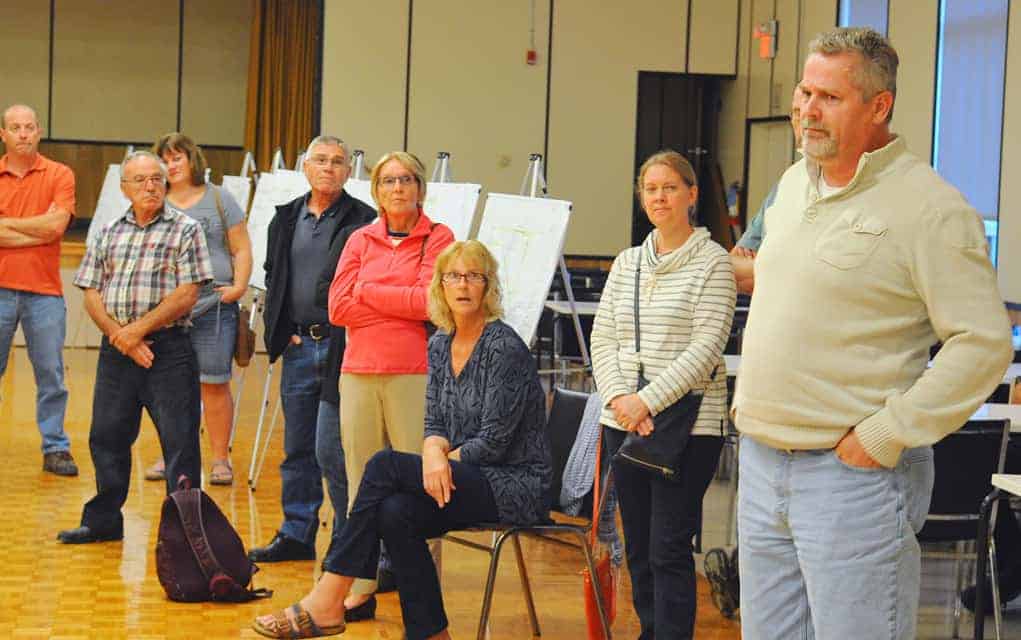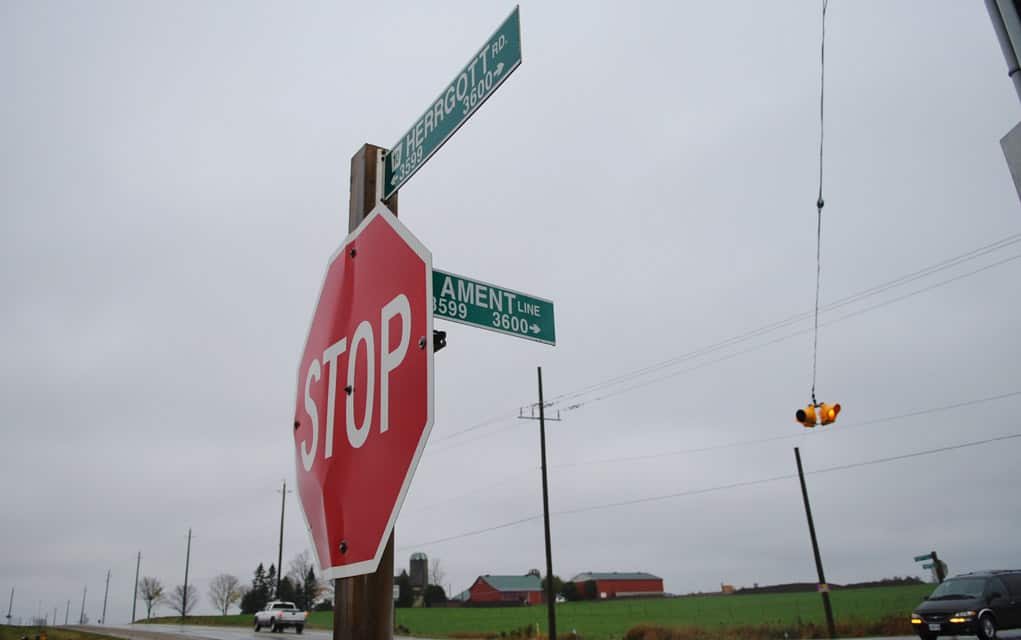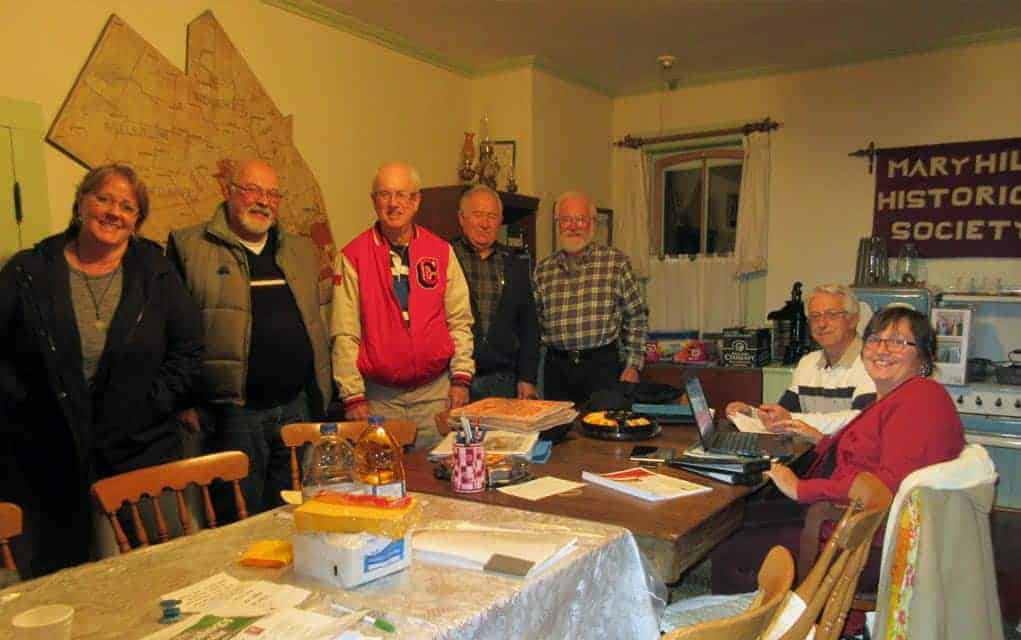The team pushing for a gravel pit in Winterbourne met a full court press as residents rallied as a team at a public information session Oct. 19 in St. Jacobs. In waves, they chipped away at Preston Sand and Gravel’s case for below-the-water-table extraction in Jigs Hollow.
Organized as the Friends of the Winterbourne Valley, the concerned citizens ramped up the fight against the controversial gravel pit. Some 65 people turned up at the community centre to voice their opposition.
Concerned citizens had hoped the plan to mine aggregate at the site was shelved when crews prepping the site found water levels near the surface, essentially halting work there. Instead, the applicant is now seeking a zone change to allow extraction below the water table, a move residents say will cause even more disruption and ultimately leave barren what today is prime farmland.
The bid to resume work at the site is just the latest skirmish in a long battle. Following a dispute eventually settled through an Ontario Municipal Board hearing, the township agreed to allow gravel to be mined at the 89-acre site fronting on Peel Street. Kuntz Topsoil, Sand and Gravel, later joined by Preston Sand and Gravel (PSG), was also granted the right to crush recycled concrete and asphalt at the site. Work began in 2013, mostly with berms being formed, but quickly halted when tests found groundwater levels to be much higher than anticipated, severely limiting the amount of aggregate accessible, as the license demands mining occur no lower than 1.5 metres above the water table.
Now, Preston Sand and Gravel has applied to the ministry for a license amendment, requesting permission to dig below the water table, drastically changing plans to rehabilitate the property back to farmland after the gravel is extracted, as outlined in the existing license. The new plan specifies that the spot would be turned into a lake or pond after the company is finished with it.
At last week’s information session, PSG had on hand a number of its experts, including sound and hydrogeology specialists, providing an opportunity for those against the amendment to ask questions. Concerns heard during the initial license application phase were heard again, with residents citing higher noise levels, questioning the preservation of historical buildings and properties and the visual impact of the pit.
This time though, there was an additional concern – what will happen after the aggregate is extracted?
“Once you have excavated below the water table, you never get Class A farmland back. It is going to be a sterile pond right next door to the Grand River. What is that going to do to well levels? What is that going to do to fish habitat? What is that going to do? There are too many questions at this point and we don’t need to be losing Class A farmland permanently. If it is above the water table, it is supposedly reclaimable, but once you are below the water table, it is pooched,” said Winterbourne resident Paul Marrow.
Hydrogeologist Kevin Fitzpatrick pointed to Snyder’s Flats in Bloomingdale as an example of what could be the end result. The crowd shot back, bringing to light that Snyder’s Flats was only viable now after considerable investment from local non-profit organizations to the tune of around $200,000.
Tony Dowling, a West Montrose resident and a member of the Friends of the Winterbourne Valley group, said the information session was valuable, even if the crowd’s questions didn’t get answered the way he wanted.
“We were respectful of each other even though I was a bit skeptical of the answers. I am happy with the questions we asked, but I am not necessarily happy with the answers we got. I think some of them were perhaps not as forthcoming or in-depth or as accurate as I might have hoped,” he said, adding that the next step for the group is to keep fighting.
“It is a matter of continuing to build public awareness, try to make the township council and staff aware of the concerns that we have, try to make the ministry aware of the concerns that we have with this idea that you can have a license issue before you even get to digging into the gravel, that you can then go back and ask if you can go under the water?”
He says he is very impressed to see how much support the cause has from residents and friends.
“This is the second time that we have had to go through this, so to go back and to your supporters and say, ‘hey guys, I know we did this a month ago, but please come back out.’ I was very pleasantly surprised with how many people came out. We have people here from Conestogo, Winterbourne, West Montrose and other places,” he said.
Those who want to either support or voice their discontent with the license amendment can still have their say by contacting the Ministry of Natural Resources and Forestry at 1 Stone Road West, Guelph, Ontario, N1G 4Y2 C/O Darren Ungar, aggregate technical specialist, by phone at 519-826-4930 or fax at 519-826-4949. The deadline for input is Nov. 14.









